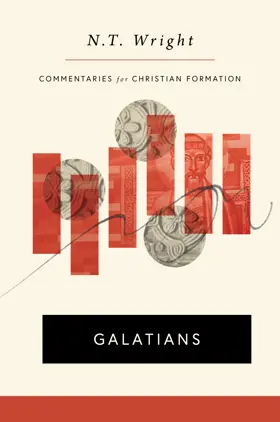

Galatians
in Commentaries for Christian Formation
Pages
440
Publisher
Eerdmans
Published
2021
ISBN-13
9780802825605
Galatians is often read by Christians as being primarily concerned with the traditional doctrine of justification through faith, but it is also a text focused deeply on the political concerns of its specific historical moment. This commentary from N. T. Wright—the inaugural volume of the Commentaries for Christian Formation series—offers a theological interpretation of Galatians that puts that historical context of the book in dialogue with present questions, so that readers can understand both what Paul meant and what his writing might mean for us today.
Each section of verse-by-verse commentary in this volume is followed by Wright’s reflections on what the text says about Christian formation today, making this an excellent resource for individual readers and those preparing to teach or preach on Galatians. The focus on formation is especially appropriate for this biblical letter, in which Paul wrote to his fellow early Christians, “My children—I seem to be in labor with you all over again, until the Messiah is fully formed in you!”
Each section of verse-by-verse commentary in this volume is followed by Wright’s reflections on what the text says about Christian formation today, making this an excellent resource for individual readers and those preparing to teach or preach on Galatians. The focus on formation is especially appropriate for this biblical letter, in which Paul wrote to his fellow early Christians, “My children—I seem to be in labor with you all over again, until the Messiah is fully formed in you!”
- Table of Contents
- Introduction to Galatians
- The Situation in Galatia
- Paul’s Answer
- Commentaries and Christian Formation
- Galatians 1:1–17
- The Charge: Pleasing People
- Galatians 1:1–5: Apostleship and the Gospel
- Galatians 1:6–9: Another Gospel?
- Galatians 1:10–17: The Story So Far
- Conclusion: Formation
- Galatians 1:18–2:10
- Galatians 1:18–24: First Jerusalem Visit: A Happy Relationship
- Galatians 2:1–10: The Second Visit: Standing Firm
- Galatians 2:1–5: “Not Compelled”
- Galatians 2:6–10: “Nothing Added”
- Conclusion
- Galatians 2:11–21
- Galatians 2:11–14: Peter in Antioch
- Galatians 2:15–21: Introduction
- Historical Exegesis
- Galatians 2:15–16
- Galatians 2:19–21
- Conclusion
- Galatians 3:1–14
- How Does Abraham’s Story Work?
- Galatians 3:1–5: The Spirit and Faith
- Galatians 3:6–9: Abraham and the Covenant
- Galatians 3:10–14: The Curse of the Law
- Galatians 3:15–29
- Galatians 3:15–18
- Galatians 3:19–22: Why Then the Law?
- Galatians 3:23–25: Under the Paidagōgos
- Galatians 3:26–29: Abraham’s One Family
- Conclusion
- Galatians 4:1–11
- Galatians 4:1–7: The New Exodus
- Galatians 4:4–7: Introduction
- Galatians: 4:8–11: Don’t Go Back to Slavery!
- Conclusion
- Galatians 4:12–5:1
- Galatians 4:12–20: True Friends and False Friends
- Galatians 4:21–5:1: Two Women, Two Families, Two Covenants, Two Mountains
- Conclusion
- Galatians 5:2–26
- Introduction
- Galatians 5:2–6: The Warning
- Galatians 5:7–12: The Challenge
- Galatians 5:13–26 Love and the Spirit
- Galatians 5:13–15: Introduction: Freedom and Love
- Galatians 5:16–18
- Galatians 5:19–26
- Galatians 6:1–18
- Galatians 6:1–10: Closing Exhortations
- Galatians 6:1–5: Mutual and Individual Responsibility
- Galatians 6:6–10: Sowing to the Flesh or the Spirit
- Galatians 6:11–18: Final Warnings and Example
- Conclusion
Reviews
(Conclusion to my linked full review) As a taster for the CCF project, this is an interesting amuse-Bouche - Wright certainly shows how a balance of deep faith and informed scholarship can produce a useful resource for Christian reflection. As a commentary on Galatians, it doesn’t really do much for me that other books have - I’d suggest (As does Wright) that Craig Keener’s intense standalone commentary does pretty much everything anyone would ever need on the book (Wright writes "There is no point in reinventing Craig's many well-oiled wheels" [p. xiii], whilst Neil Martin’s recent Galatians Reconsidered is a monograph that isn’t a commentary that has a lot to say around spiritual formation and discipleship (Wright does reference Martin's earlier work on p. 276). I’m intrigued to see what the CCF series will shape up to be - and I think Wright’s entry is a good book on Galatians, but it isn’t quite the ‘great’ ‘major’ commentary it is advertised as. That, however, is probably a good thing, as the book that it is is a useful tool for preachers, and (once you get past the introduction) a helpful devotional read for thoughtful disciples.
[Full Review]
